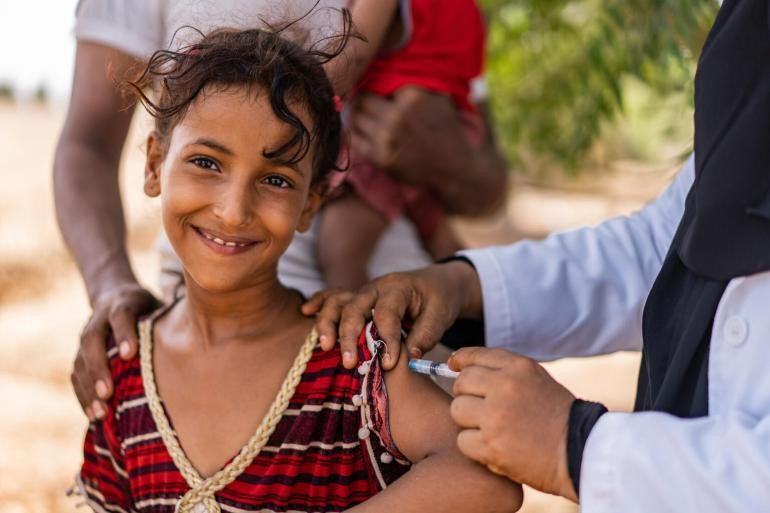According to UNICEF, among 67 million children whose basic routine vaccinations were disrupted, 48 completely missed their shots, raising the risk of measles and polio outbreaks.
Child immunisation has declined in 112 countries, with the percentage of children vaccinated worldwide falling to 81%, the lowest since 2008. Africa and South Asia are the two regions recording the most dramatic declines.
UNICEF’s expert Brian Keeley said, that in addition to the COVID-19 pandemic, the drop in vaccination was also the result of many other crises such as conflict, climate change and food insecurity.
According to UNICEF, among 67 million children whose basic routine vaccinations were disrupted, 48 completely missed their shots, raising the risk of measles and polio outbreaks.
The latest report titled “The State of the World’s Children 2023: For every child, vaccination” released by UNICEF, noted that more than a decade of hard-earned gains in routine childhood immunisation has been eroded while saying that getting back on track would be “challenging”.
According to the UN, vaccines saved 4.4 million lives every year. This number could increase to 5.8 million by 2030 if the world achieves its goal of leaving no one behind.
Before the vaccines were available in 1963, measles killed 2.6 million people each year, mostly children. This number fell to 128,000 by 2021. However, during the 2019-2021 period, the percentage of children vaccinated against measles fell from 86% to 81% and the number of cases in 2022 doubled, compared to 2021.
Africa is the region with the highest number of unvaccinated children, with 12.7 million children who were not fully vaccinated, of which 8.7 million have not received any shots.
Of the 20 countries with the highest number of unvaccinated children, 10 come from Africa. In particular, Nigeria and Ethiopia are the two countries recording the highest number of "unvaccinated" children in the continent, with more than 2.2 million and 1.1 million, respectively.
The UNICEF Regional Director for Eastern and Southern Africa Mohamed M. Malick Fall assessed the recent resurgence of measles, cholera and poliovirus in Africa, as a warning to the continent's leaders to make efforts to narrow the vaccination gap and ensure all children are protected.
Of the 20 countries with the highest number of unvaccinated children, 10 come from Africa. In particular, Nigeria and Ethiopia are the two countries recording the highest number of "unvaccinated" children in the continent, with more than 2.2 million and 1.1 million, respectively.
UNICEF called on governments to double down on their commitment to increase financing for immunisation and accelerate basic immunisation programmes, especially for children who missed out on vaccinations during the COVID-19 outbreak.
In addition, the impact of conflict, rising food prices and climate change, have pushed nearly 1 million children in Africa's Sahel region, to face acute malnutrition.
According to UNICEF, approximately 970,000 children under 5, in three countries of this region, including Burkina Faso, Mali and Niger, face severe malnutrition by 2023. Niger and Mali are forecast to report 430,000 and 367,000 severely malnourished children, respectively, up 18% over 2022. UNICEF calls on governments to place child nutrition as the top priority of their national agendas and strengthen investment in the prevention, detection and early treatment of child malnutrition.
The UNICEF Regional Director for West and Central Africa Marie-Pierre Poirie said, more severe insecurity and conflict mean that the vulnerability in the region has been increasing and assistance for communities in isolated areas has become more difficult.
















